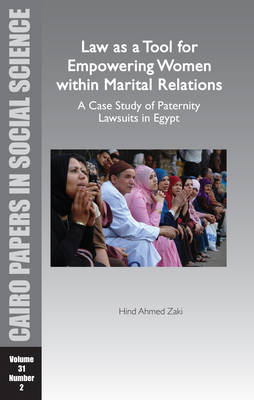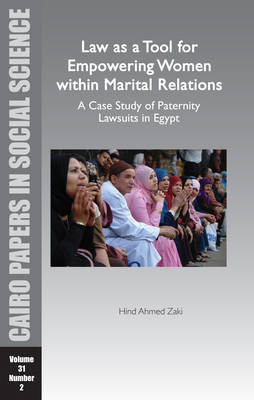
- Afhalen na 1 uur in een winkel met voorraad
- Gratis thuislevering in België vanaf € 30
- Ruim aanbod met 7 miljoen producten
- Afhalen na 1 uur in een winkel met voorraad
- Gratis thuislevering in België vanaf € 30
- Ruim aanbod met 7 miljoen producten
Zoeken
Law as a Tool for Empowering Women Within Marital Relations: A Case Study of Paternity Lawsuits in Egypt
Cairo Papers Vol. 31, No. 2
Hind Ahmed Zaki
€ 33,95
+ 67 punten
Omschrijving
How do women use courts within the context of paternity lawsuits? This study analyzes the challenges that the formal legal approach to empowering women faces once it is translated into everyday socio-legal experiences and court repertoires. It also seeks to trace the pathologies inherent in personal status law reform and normal legal practices in Egypt, attesting to the limitations of law as an agent of social change in the private domain of the family. It mainly sheds light on the difficulties of separating formal legal rules from informal social practices. It also explores the problem of paternity claims in Egypt. Adding to growing literature on the use of legal mobilization to advance gender equity, this study offers insights on the often-neglected role of social norms in court experiences, often leading to unexpected consequences that sometimes defy the intended goals behind policies and legislation.
Specificaties
Betrokkenen
- Auteur(s):
- Uitgeverij:
Inhoud
- Aantal bladzijden:
- 128
- Taal:
- Engels
- Reeks:
Eigenschappen
- Productcode (EAN):
- 9789774165085
- Verschijningsdatum:
- 31/05/2012
- Uitvoering:
- Paperback
- Formaat:
- Trade paperback (VS)
- Afmetingen:
- 140 mm x 213 mm
- Gewicht:
- 204 g

Alleen bij Standaard Boekhandel
+ 67 punten op je klantenkaart van Standaard Boekhandel
Beoordelingen
We publiceren alleen reviews die voldoen aan de voorwaarden voor reviews. Bekijk onze voorwaarden voor reviews.











